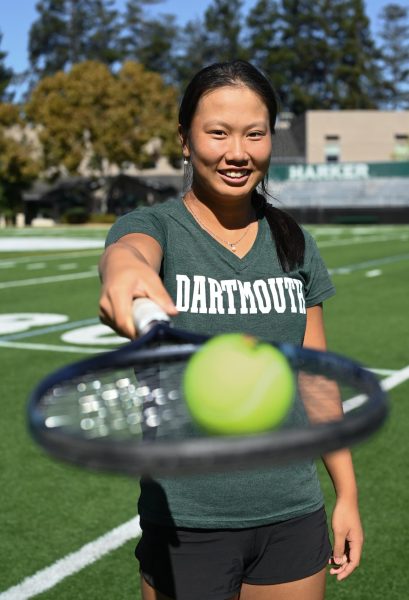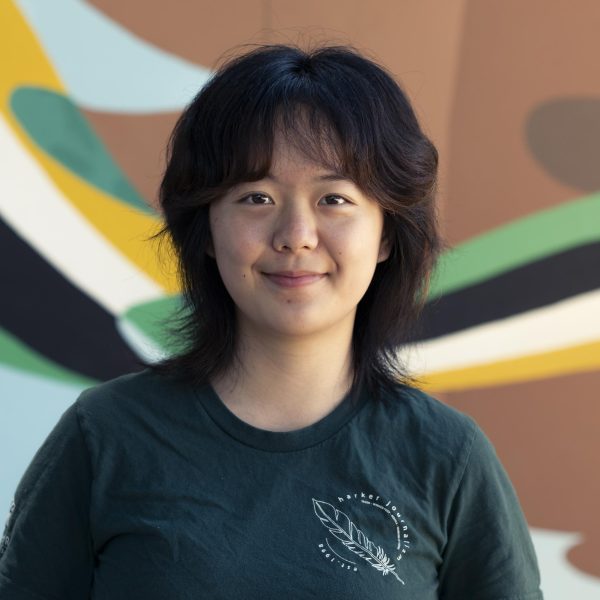
Hawaii, Florida and Wisconsin — even Edmond, Oklahoma — are all places senior Audrey Feng played tournaments in throughout her competitive tennis career. However, no matter where she plays, the rhythm of competition and familiar faces around her makes every location feel familiar.
“It’s a pretty sweet opportunity to be able to go to these places to play tennis, and I’m really grateful for that,” Audrey said. “You meet so many different people; I know people from across the country and have their numbers and we talk. We only get to see each other a few times a year, but there’s a few big tournaments where people come from all over — Florida, Michigan, New York, all these different places.”
Audrey appreciates tennis for its challenges and layers of intricacy, both on and off the court. From the constant need for improvement to the dynamic, split-second decision-making, tennis demands a lot from its athletes.
“It’s such a complex sport,” Audrey said. “There’s a lot of ways to get to college level playing, and you don’t really need to be the best at every single thing. Everyone has such a different play style, and beyond the physical aspect and strategy in the game, there’s also the mental aspect. How well-rounded the sport is made me attracted to it.”
Similar to many athletes, Audrey finds that her journey in tennis is shaped not only by individual talent but also by the careful planning that goes into each practice session, each drilled stroke and each small change to her technique. Throughout the years, she has been in charge of her own career, adding a further layer of difficulty.
“Putting in the work is the simplest part,” Audrey said. “It’s still hard though because you need to be disciplined and have a certain amount of motivation and drive and also to like the sport. But figuring out how exactly to go about doing that — what your schedule is, what exercises you need to do — is the hardest part. My family and I have managed my entire career, so figuring out what exactly I need to do has been really tough.”
Since freshman year, Audrey has shared moments in both her tennis journey and life as a student with close friend senior Isabella Lo. Their bond goes beyond one simply between two student athletes, strengthened by honesty and laughter, even and especially during difficult moments.
“She’s someone who embraces her struggles and still is able to be lighthearted about them,” Isabella said. “When she’s talking about tennis, she’s very honest about what she doesn’t like, what she does, what she enjoys. It’s refreshing to have someone who’s always going to tell you the truth about what they’re feeling or thinking.”
For Audrey, finding balance between academics and sports has been a continuous lesson in resilience. The mental demands of switching quickly from focusing on intense matches to a more academic mindset regarding schoolwork and exams require constant discipline and focus.
“Sports is one thing where you need to be able to keep your brain in separate spheres and be able to switch from your school mindset to the sports one really quickly and reset,” Audrey said. “If you have a bad tournament, you can’t dwell on it. You have to do your homework, go back home, study and also to be able to sleep. Otherwise, you’re not going to do well — your reaction time is slower, and you’re going to get injured.”
Close friend senior Katerina Matta, who has known Audrey since sixth grade, has witnessed her evolution both on and off the court. She recognizes how, throughout the course of their friendship, Audrey has grown into her own, becoming more confident in herself.
“Since I’ve known her, I’ve definitely seen her become a lot more confident in herself as well as in developing relationships with others and using her voice more,” Katerina said. “But she’s also a really good listener, and part of that comes from her having been quieter early in life. If you have any problem at all, she’ll sit there through it with you and she won’t be afraid to be the shoulder that you need.”
Among Audrey’s supporters is her advisor, math teacher Dana Lieberman, who has supported her throughout her entire high school experience. For her, seeing Audrey’s steady focus and resilience has been inspiring, especially in the high-pressure environment that student-athletes often navigate.
“She’s towered over me from day one,” Lieberman said. “She may have been young, but she never was little. She’s always been one of the calmer people in our advisory — either she hides stress well, or she’s just generally on an even heel all the time. She always looks super balanced.”
Audrey sees athletics as more than a pursuit of victories; it’s a continuous process of learning skills that she believes will serve her well in the future. Many athletes find that the mental endurance they develop on the field or court translates into other areas of life, helping them manage stress and adapt to unexpected challenges. For Audrey, sports provides a structured environment to build these skills, preparing her for the unpredictability of life beyond high school.
“Being a student athlete teaches you so much beyond time management,” Audrey said. “It makes people a lot more resilient, and it teaches them how to deal with tough situations. Sports is still a more controlled setting, and it’s not my whole life. It’s a test run for real life when I’ll face hard situations that could be make-or-break. But I know how to navigate it better, how to problem solve, and how to not give up even when things get tough.”


















![“[Building nerf blasters] became this outlet of creativity for me that hasn't been matched by anything else. The process [of] making a build complete to your desire is such a painstakingly difficult process, but I've had to learn from [the skills needed from] soldering to proper painting. There's so many different options for everything, if you think about it, it exists. The best part is [that] if it doesn't exist, you can build it yourself," Ishaan Parate said.](https://harkeraquila.com/wp-content/uploads/2022/08/DSC_8149-900x604.jpg)




![“When I came into high school, I was ready to be a follower. But DECA was a game changer for me. It helped me overcome my fear of public speaking, and it's played such a major role in who I've become today. To be able to successfully lead a chapter of 150 students, an officer team and be one of the upperclassmen I once really admired is something I'm [really] proud of,” Anvitha Tummala ('21) said.](https://harkeraquila.com/wp-content/uploads/2021/07/Screen-Shot-2021-07-25-at-9.50.05-AM-900x594.png)







![“I think getting up in the morning and having a sense of purpose [is exciting]. I think without a certain amount of drive, life is kind of obsolete and mundane, and I think having that every single day is what makes each day unique and kind of makes life exciting,” Neymika Jain (12) said.](https://harkeraquila.com/wp-content/uploads/2017/06/Screen-Shot-2017-06-03-at-4.54.16-PM.png)








![“My slogan is ‘slow feet, don’t eat, and I’m hungry.’ You need to run fast to get where you are–you aren't going to get those championships if you aren't fast,” Angel Cervantes (12) said. “I want to do well in school on my tests and in track and win championships for my team. I live by that, [and] I can do that anywhere: in the classroom or on the field.”](https://harkeraquila.com/wp-content/uploads/2018/06/DSC5146-900x601.jpg)
![“[Volleyball has] taught me how to fall correctly, and another thing it taught is that you don’t have to be the best at something to be good at it. If you just hit the ball in a smart way, then it still scores points and you’re good at it. You could be a background player and still make a much bigger impact on the team than you would think,” Anya Gert (’20) said.](https://harkeraquila.com/wp-content/uploads/2020/06/AnnaGert_JinTuan_HoHPhotoEdited-600x900.jpeg)

![“I'm not nearly there yet, but [my confidence has] definitely been getting better since I was pretty shy and timid coming into Harker my freshman year. I know that there's a lot of people that are really confident in what they do, and I really admire them. Everyone's so driven and that has really pushed me to kind of try to find my own place in high school and be more confident,” Alyssa Huang (’20) said.](https://harkeraquila.com/wp-content/uploads/2020/06/AlyssaHuang_EmilyChen_HoHPhoto-900x749.jpeg)



